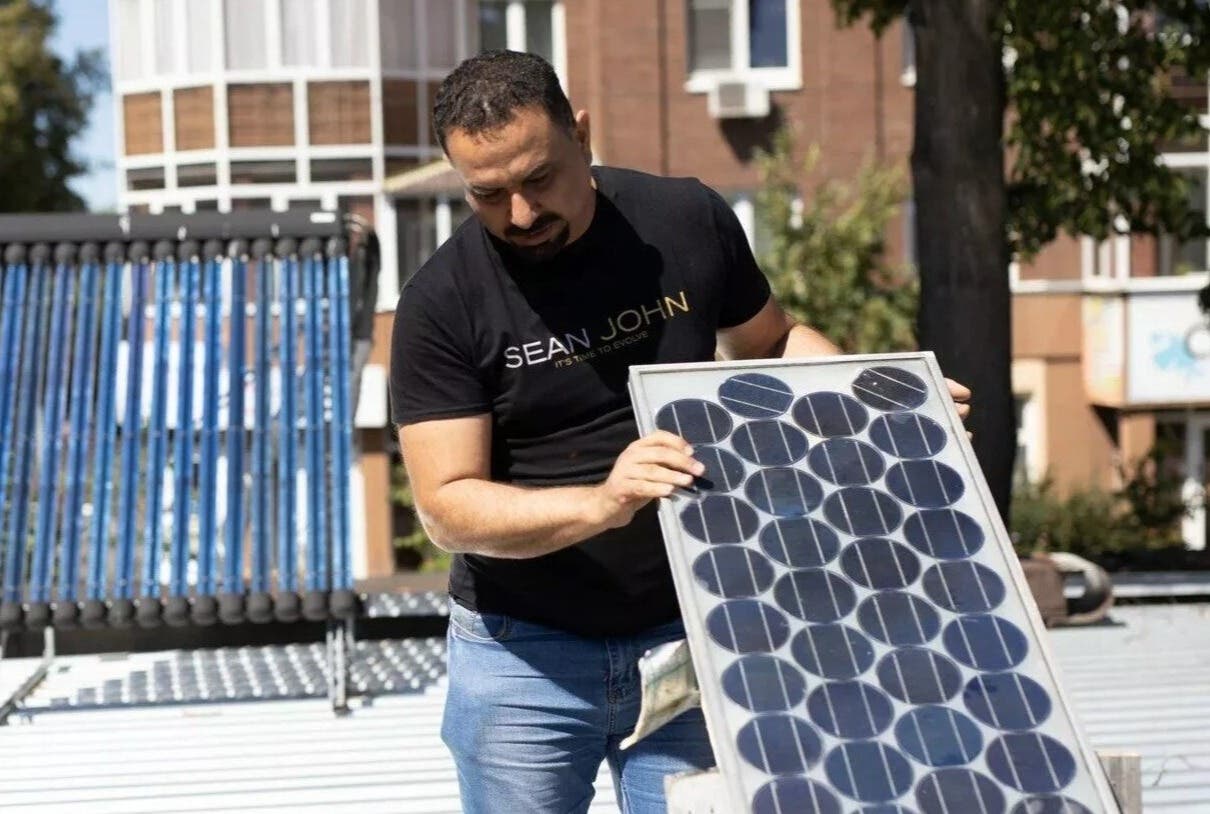Breakthrough solar technology extracts 400% more salt from seawater
A new solar-powered desalination technology will significantly reduce the cost of desalination and quadruple the volume of production.

[Nov 12, 2022: Sergei Shcheklein, Ural Federal University]
Nasir Alvan, a research engineer at the Department of Nuclear Power Plants and Renewable Energy Sources, works with a modified installation. (CREDIT: UrFU / Ilya Safarov)
Ural Federal University (UrFU) power engineers have developed a new desalination technology. It will significantly reduce the cost of desalination and quadruple the volume of production. The results of the research are published in the journal Case Studies in Thermal Engineering.
Today one of the most popular and simple ways of desalination is the distillation of water with the help of solar energy. UrFU scientists, together with colleagues from Iraq, have developed a hybrid technology to increase the efficiency of evaporation inside a solar distiller by means of a rotating hollow cylinder and a solar collector.
“We created a desalination technology by using a rotating hollow cylinder inside the solar distiller to accelerate water evaporation in the vessel by forming a thin film of water on the outer and inner surface of the cylinder, which is constantly renewed with each turn. To increase the temperature of water under the cylinder we use a solar collector," said the head of the department Nuclear power plants and renewable energy sources UrFU Sergei Shcheklein.
As part of the experiment, the rotation speed of the cylinder inside the solar distiller was 0.5 rpm. This intensity and time are enough to evaporate a thin film of water from the surface of the cylinder.
Related Stories
Experimental tests were held in Ekaterinburg, Russia for several months (June-October, 2019) and showed high efficiency and reliability of the developed device. In addition, the researchers noted that the relatively high intensity of solar radiation and low ambient air temperature also contributed to the performance of water distillation.
“The performance improvement factor of the created solar distiller, compared to traditional devices, was at least 280% in the relatively hot months (June, July, and August) and at least 300% and 400% in the cooler months (September and October). At the same time, the cumulative water distillation capacity reached 12.5 l/m2 per day in summer and 3.5 l/m2 per day in winter," said Alharbawi Naseer Tawfik Alwan, a research engineer at UrFU and an employee of Northern Technical University (Iraq).
Photographic view of the modified solar still and the traditional solar still. (CREDIT: UrFU / Ilya Safarov)
The developed desalination technology with its simple design and low cost could be of interest in the Middle East and Africa — in countries with high solar energy potential and a shortage of fresh water, believe researchers.
Today one of the most popular and simple ways of desalination is the distillation of water with the help of solar energy. (CREDIT: Creative Commons)
In the future, scientists plan to improve the technology and increase the performance of the solar distiller at the lowest possible capital and operating costs for different climatic conditions.
Note:
According to the UN, more than 40% of the world's population suffers from water shortages: more than 700 million people on the planet have no access to clean water, and more than 1.7 billion people living in river basins need additional sources of fresh water.
For more science stories check out our New Innovations section at The Brighter Side of News.
Note: Materials provided above by Ural Federal University. Content may be edited for style and length.
Like these kind of feel good stories? Get the Brighter Side of News' newsletter.
Joseph Shavit
Head Science News Writer | Communicating Innovation & Discovery
Based in Los Angeles, Joseph Shavit is an accomplished science journalist, head science news writer and co-founder at The Brighter Side of News, where he translates cutting-edge discoveries into compelling stories for a broad audience. With a strong background spanning science, business, product management, media leadership, and entrepreneurship, Joseph brings a unique perspective to science communication. His expertise allows him to uncover the intersection of technological advancements and market potential, shedding light on how groundbreaking research evolves into transformative products and industries.



